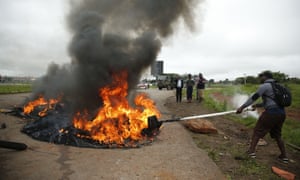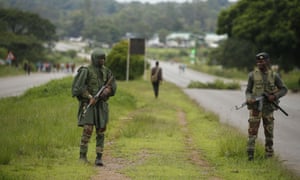
Police and military have launched a massive crackdown in Zimbabwe after what appears to be have been a widespread breakdown of public order linked to food and fuel shortages in the impoverished country.
Access to the internet and social media was shut off for most of Wednesday, and armed soldiers were patrolling the streets of major cities as unidentified men were reported to be sweeping through poor neighbourhoods of Harare, the capital, and beating people “at random”.
Activists, lawyers and other citizens described a wave of abductions in and around Harare. In some poor neighbourhoods, groups of young men set up roadblocks and were stoning the few vehicles on the roads.
Police cells across the city are “full to capacity”, packed with large numbers of men and children.
“The internet shutdown has been [used] to cover up a massive operation of repression,” said Doug Coltart, a lawyer who spoke to more than 30 detainees at the Harare’s central prison on Wednesday. Some were children.
“Most said they had been abducted from homes by masked men with AK47s who dragged them out and beat them up. They are being held without charges or representation, with no food or water … The brutality of what is going on is shocking.”
Police sealed off the centre of the southern city of Bulawayo following rioting and widespread looting. Security forces in the city beat people in their homes, forced residents to remove barricades from streets and fired on looters, local witnesses said. At least one person has been shot dead.
The disorder followed a national strike called from Monday by unions in response to a steep rise in fuel prices ordered by President Emmerson Mnangagwa, a ruling party stalwart who took power when Robert Mugabe was forced to resign after a military takeover in November 2017.
Legacies of Mugabe’s 37-year rule include massive unemployment, huge government debts, an acute shortage of hard currency and a crumbling infrastructure.
Desperation for food has forced some people to venture out in major cities but virtually all shops are closed and fuel stations empty. “I went out to buy some vegetables for my sick mother and the streets were full of sullen, hostile young men. They tried to make me buy a single mango for $15,” said one Harare resident.

Police fired teargas in the capital after a crowd tried to overrun a shopping centre that opened to sell bread. Soldiers with AK-47s took charge of the long line.
The Zimbabwe Association of Doctors for Human Rights, a respected NGO, said it had received reports of human rights violations across Zimbabwe.
Its members had attended to more than 100 patients by Tuesday afternoon, some with serious injuries. One doctor said they had treated at least 30 people with gunshot wounds, and 80 victims of serious assault.
Activists working to provide care to victims of political violence said hundreds of people had been injured, but the true total was unknown because many were too frightened to seek medical treatment.
“Things are very grim. It is very confused. No one knows what is happening,” said one veteran human rights worker.
Eight people including a police officer died during clashes on Monday, according to human rights activists.
Mnangagwa is travelling in Asia and Europe, leaving the hardline vice-president, Constantino Chiwenga, in charge. Chiwenga has been blamed for the shooting by soldiers of six civilians during opposition protests days after Zimbabwe’s election on 30 July last year, and for a brutal wave of repression after the results were announced in August.
It is unclear who is conducting the raids, but their methods are very similar to those of security forces during the wave of repression following the election, which was won by Mnangagwa. It is also unclear to what extent the disorder and protests over the last 48 hours have been centrally organised.
In a post on his Facebook account on Wednesday, Mnangagwa said he was saddened by the “wanton violence and cynical destruction” during the protests. The information minister, Monica Mutsvangwa, said on state television on Tuesday night that the demonstrations amounted to “terrorism” and were “well-coordinated” by the opposition.
The crackdown has largely targeted opposition strongholds, though the leader of the ruling Zanu-PF party’s youth wing was arrested along with six others for burning buses belonging to the state-owned transport company.
Amos Chibaya, a senior official in the Movement for Democratic Change – Zimbabwe’s main opposition party, said “unknown assailants” had attacked his home in Harare on Tuesday night and then again on Wednesday morning.
Evan Mawarire, a pastor and prominent social media activist, was arrested his home in Harare early on Wednesday morning and has been charged with inciting violence.
Speaking to the Guardian moments before his arrest, Mawarire described armed police massing outside his house. “They are not letting anyone in or out except my lawyer,” he said.
Residents of Kuwadzana, a poor neighbourhood of Harare, said unidentified men had been going “door to door”. “They smashed our windows then burned out our car,” said Carol Maguwu, 27.
Relatives of Kinos Shoko, another resident, said the 56-year-old had been abducted at noon on Tuesday by unidentified men and returned to his home at midnight, very badly beaten and unable to hear or speak.


